International Entrepreneurship & Economic Development: A Review
VerifiedAdded on 2023/06/10
|16
|3808
|314
Essay
AI Summary
This paper examines the crucial role of entrepreneurs in fostering economic growth, emphasizing their contributions to job creation, capital formation, and balanced regional development. It distinguishes between opportunity-driven and necessity-driven entrepreneurs, highlighting the superior efficiency and productivity of the former. The analysis extends to the impact of formal versus informal entrepreneurship on economic development, noting the challenges posed by informal businesses. Economic development is defined as the advancement of a nation's economic, political, and social status, with entrepreneurship acting as a catalyst for economic activities. The paper also outlines the characteristics and skills necessary for entrepreneurial success, such as risk-taking, creativity, initiative, and individuality. It concludes by discussing how entrepreneurs promote capital formation, create employment, reduce economic power concentration, and improve living standards, ultimately contributing to increased gross national product and per capita income.

INTERNATIONAL ENTREPRENEURSHIP AND ECONOMIC DEVELOPMENT
Name of the Student
Name of the Professor
City/State
Date/Month/Year
Name of the Student
Name of the Professor
City/State
Date/Month/Year
Paraphrase This Document
Need a fresh take? Get an instant paraphrase of this document with our AI Paraphraser
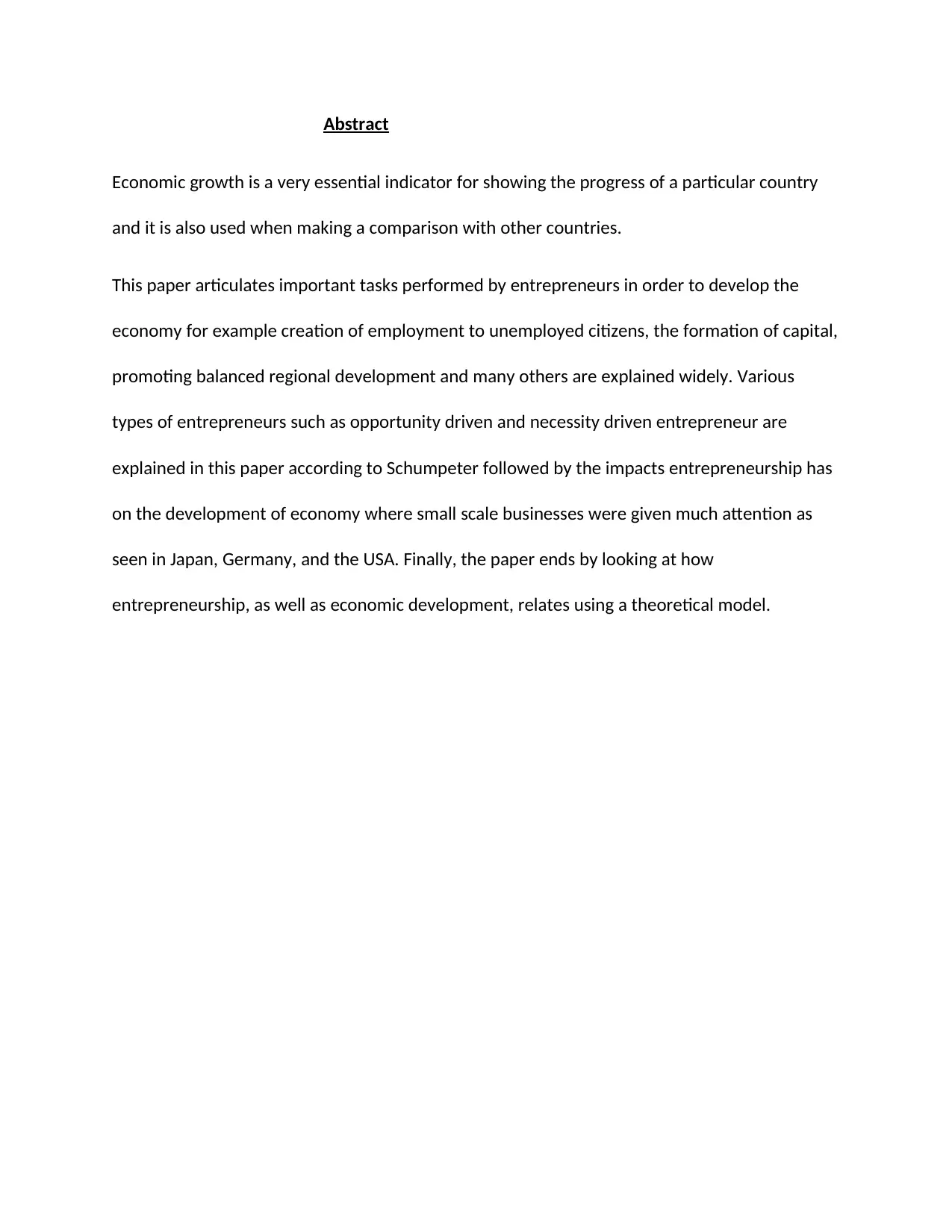
Abstract
Economic growth is a very essential indicator for showing the progress of a particular country
and it is also used when making a comparison with other countries.
This paper articulates important tasks performed by entrepreneurs in order to develop the
economy for example creation of employment to unemployed citizens, the formation of capital,
promoting balanced regional development and many others are explained widely. Various
types of entrepreneurs such as opportunity driven and necessity driven entrepreneur are
explained in this paper according to Schumpeter followed by the impacts entrepreneurship has
on the development of economy where small scale businesses were given much attention as
seen in Japan, Germany, and the USA. Finally, the paper ends by looking at how
entrepreneurship, as well as economic development, relates using a theoretical model.
Economic growth is a very essential indicator for showing the progress of a particular country
and it is also used when making a comparison with other countries.
This paper articulates important tasks performed by entrepreneurs in order to develop the
economy for example creation of employment to unemployed citizens, the formation of capital,
promoting balanced regional development and many others are explained widely. Various
types of entrepreneurs such as opportunity driven and necessity driven entrepreneur are
explained in this paper according to Schumpeter followed by the impacts entrepreneurship has
on the development of economy where small scale businesses were given much attention as
seen in Japan, Germany, and the USA. Finally, the paper ends by looking at how
entrepreneurship, as well as economic development, relates using a theoretical model.
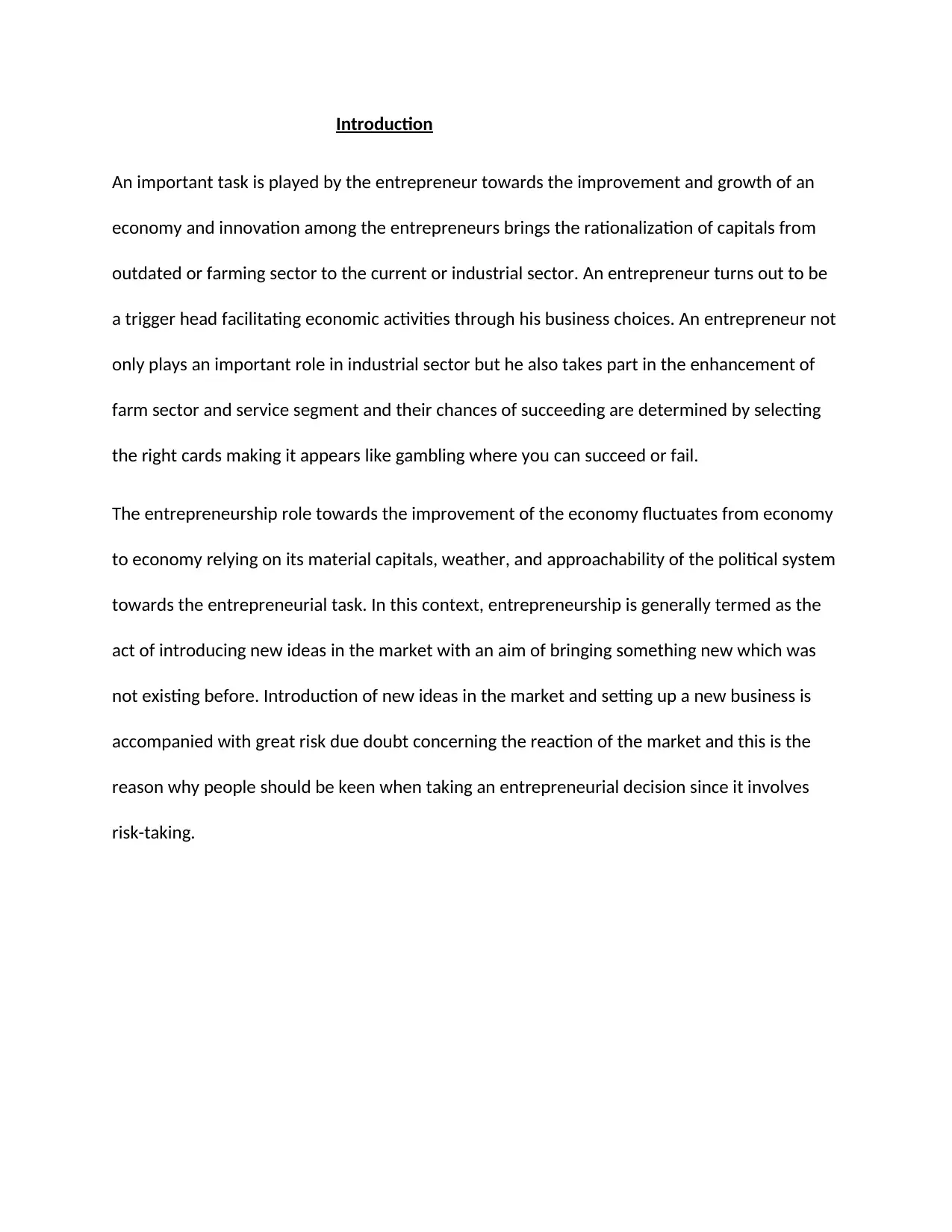
Introduction
An important task is played by the entrepreneur towards the improvement and growth of an
economy and innovation among the entrepreneurs brings the rationalization of capitals from
outdated or farming sector to the current or industrial sector. An entrepreneur turns out to be
a trigger head facilitating economic activities through his business choices. An entrepreneur not
only plays an important role in industrial sector but he also takes part in the enhancement of
farm sector and service segment and their chances of succeeding are determined by selecting
the right cards making it appears like gambling where you can succeed or fail.
The entrepreneurship role towards the improvement of the economy fluctuates from economy
to economy relying on its material capitals, weather, and approachability of the political system
towards the entrepreneurial task. In this context, entrepreneurship is generally termed as the
act of introducing new ideas in the market with an aim of bringing something new which was
not existing before. Introduction of new ideas in the market and setting up a new business is
accompanied with great risk due doubt concerning the reaction of the market and this is the
reason why people should be keen when taking an entrepreneurial decision since it involves
risk-taking.
An important task is played by the entrepreneur towards the improvement and growth of an
economy and innovation among the entrepreneurs brings the rationalization of capitals from
outdated or farming sector to the current or industrial sector. An entrepreneur turns out to be
a trigger head facilitating economic activities through his business choices. An entrepreneur not
only plays an important role in industrial sector but he also takes part in the enhancement of
farm sector and service segment and their chances of succeeding are determined by selecting
the right cards making it appears like gambling where you can succeed or fail.
The entrepreneurship role towards the improvement of the economy fluctuates from economy
to economy relying on its material capitals, weather, and approachability of the political system
towards the entrepreneurial task. In this context, entrepreneurship is generally termed as the
act of introducing new ideas in the market with an aim of bringing something new which was
not existing before. Introduction of new ideas in the market and setting up a new business is
accompanied with great risk due doubt concerning the reaction of the market and this is the
reason why people should be keen when taking an entrepreneurial decision since it involves
risk-taking.
⊘ This is a preview!⊘
Do you want full access?
Subscribe today to unlock all pages.

Trusted by 1+ million students worldwide
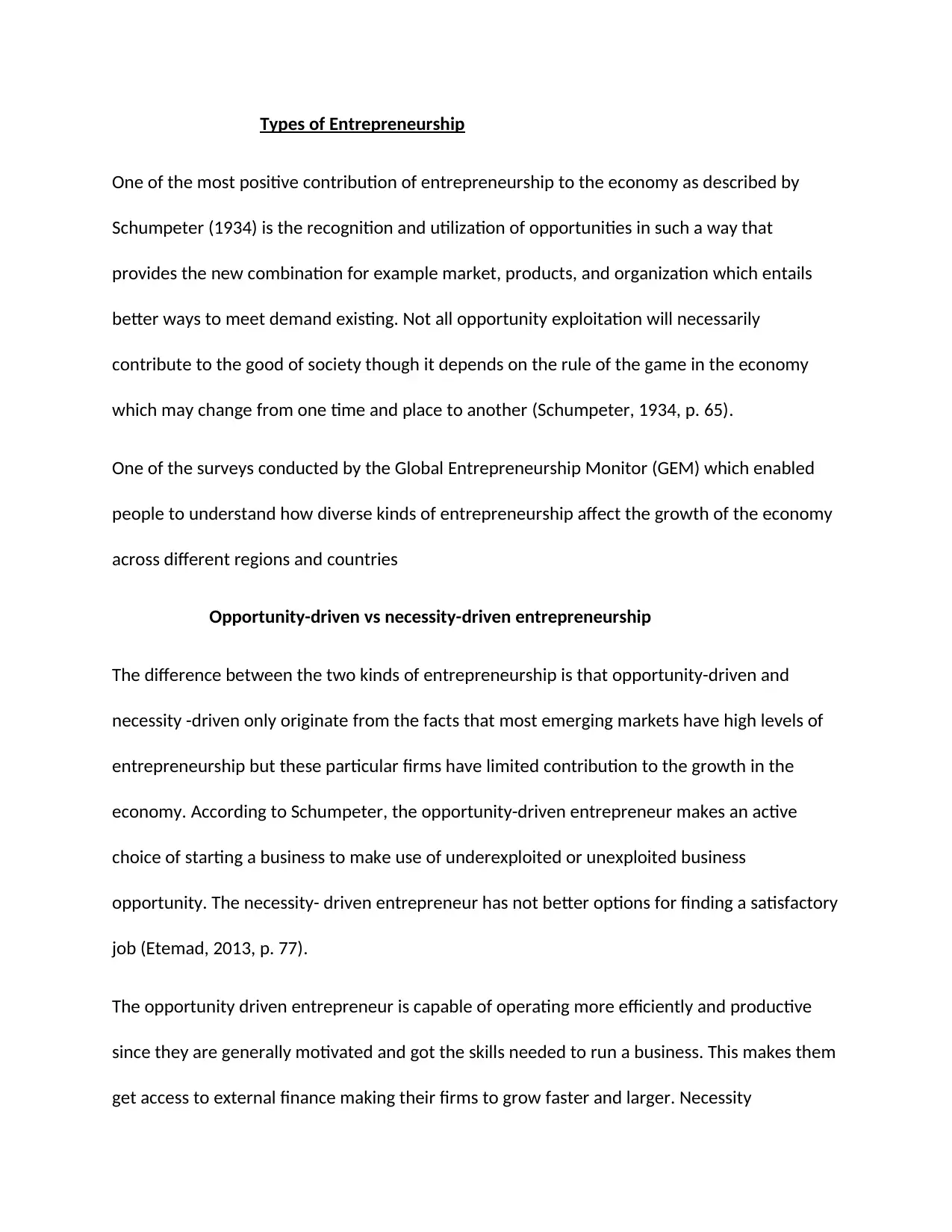
Types of Entrepreneurship
One of the most positive contribution of entrepreneurship to the economy as described by
Schumpeter (1934) is the recognition and utilization of opportunities in such a way that
provides the new combination for example market, products, and organization which entails
better ways to meet demand existing. Not all opportunity exploitation will necessarily
contribute to the good of society though it depends on the rule of the game in the economy
which may change from one time and place to another (Schumpeter, 1934, p. 65).
One of the surveys conducted by the Global Entrepreneurship Monitor (GEM) which enabled
people to understand how diverse kinds of entrepreneurship affect the growth of the economy
across different regions and countries
Opportunity-driven vs necessity-driven entrepreneurship
The difference between the two kinds of entrepreneurship is that opportunity-driven and
necessity -driven only originate from the facts that most emerging markets have high levels of
entrepreneurship but these particular firms have limited contribution to the growth in the
economy. According to Schumpeter, the opportunity-driven entrepreneur makes an active
choice of starting a business to make use of underexploited or unexploited business
opportunity. The necessity- driven entrepreneur has not better options for finding a satisfactory
job (Etemad, 2013, p. 77).
The opportunity driven entrepreneur is capable of operating more efficiently and productive
since they are generally motivated and got the skills needed to run a business. This makes them
get access to external finance making their firms to grow faster and larger. Necessity
One of the most positive contribution of entrepreneurship to the economy as described by
Schumpeter (1934) is the recognition and utilization of opportunities in such a way that
provides the new combination for example market, products, and organization which entails
better ways to meet demand existing. Not all opportunity exploitation will necessarily
contribute to the good of society though it depends on the rule of the game in the economy
which may change from one time and place to another (Schumpeter, 1934, p. 65).
One of the surveys conducted by the Global Entrepreneurship Monitor (GEM) which enabled
people to understand how diverse kinds of entrepreneurship affect the growth of the economy
across different regions and countries
Opportunity-driven vs necessity-driven entrepreneurship
The difference between the two kinds of entrepreneurship is that opportunity-driven and
necessity -driven only originate from the facts that most emerging markets have high levels of
entrepreneurship but these particular firms have limited contribution to the growth in the
economy. According to Schumpeter, the opportunity-driven entrepreneur makes an active
choice of starting a business to make use of underexploited or unexploited business
opportunity. The necessity- driven entrepreneur has not better options for finding a satisfactory
job (Etemad, 2013, p. 77).
The opportunity driven entrepreneur is capable of operating more efficiently and productive
since they are generally motivated and got the skills needed to run a business. This makes them
get access to external finance making their firms to grow faster and larger. Necessity
Paraphrase This Document
Need a fresh take? Get an instant paraphrase of this document with our AI Paraphraser
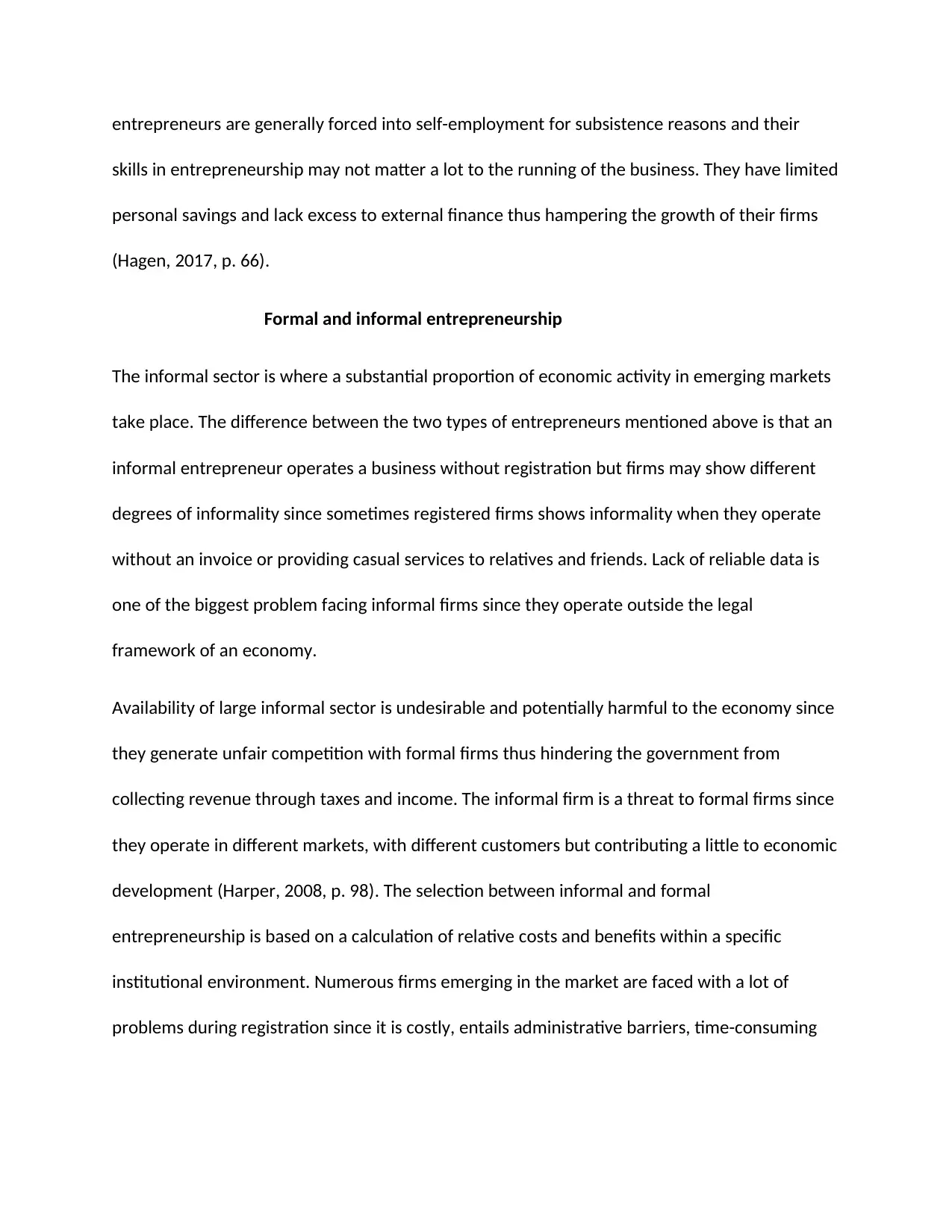
entrepreneurs are generally forced into self-employment for subsistence reasons and their
skills in entrepreneurship may not matter a lot to the running of the business. They have limited
personal savings and lack excess to external finance thus hampering the growth of their firms
(Hagen, 2017, p. 66).
Formal and informal entrepreneurship
The informal sector is where a substantial proportion of economic activity in emerging markets
take place. The difference between the two types of entrepreneurs mentioned above is that an
informal entrepreneur operates a business without registration but firms may show different
degrees of informality since sometimes registered firms shows informality when they operate
without an invoice or providing casual services to relatives and friends. Lack of reliable data is
one of the biggest problem facing informal firms since they operate outside the legal
framework of an economy.
Availability of large informal sector is undesirable and potentially harmful to the economy since
they generate unfair competition with formal firms thus hindering the government from
collecting revenue through taxes and income. The informal firm is a threat to formal firms since
they operate in different markets, with different customers but contributing a little to economic
development (Harper, 2008, p. 98). The selection between informal and formal
entrepreneurship is based on a calculation of relative costs and benefits within a specific
institutional environment. Numerous firms emerging in the market are faced with a lot of
problems during registration since it is costly, entails administrative barriers, time-consuming
skills in entrepreneurship may not matter a lot to the running of the business. They have limited
personal savings and lack excess to external finance thus hampering the growth of their firms
(Hagen, 2017, p. 66).
Formal and informal entrepreneurship
The informal sector is where a substantial proportion of economic activity in emerging markets
take place. The difference between the two types of entrepreneurs mentioned above is that an
informal entrepreneur operates a business without registration but firms may show different
degrees of informality since sometimes registered firms shows informality when they operate
without an invoice or providing casual services to relatives and friends. Lack of reliable data is
one of the biggest problem facing informal firms since they operate outside the legal
framework of an economy.
Availability of large informal sector is undesirable and potentially harmful to the economy since
they generate unfair competition with formal firms thus hindering the government from
collecting revenue through taxes and income. The informal firm is a threat to formal firms since
they operate in different markets, with different customers but contributing a little to economic
development (Harper, 2008, p. 98). The selection between informal and formal
entrepreneurship is based on a calculation of relative costs and benefits within a specific
institutional environment. Numerous firms emerging in the market are faced with a lot of
problems during registration since it is costly, entails administrative barriers, time-consuming
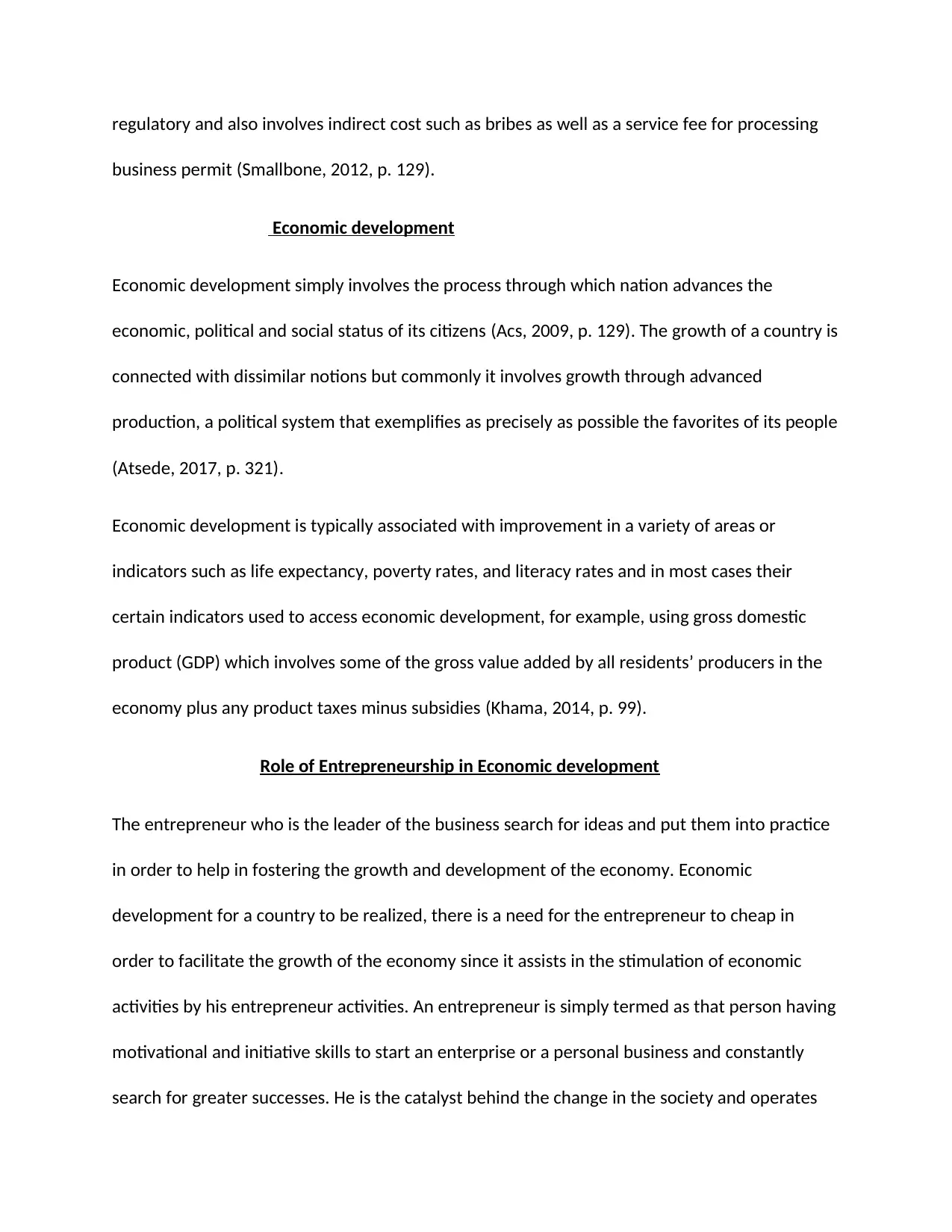
regulatory and also involves indirect cost such as bribes as well as a service fee for processing
business permit (Smallbone, 2012, p. 129).
Economic development
Economic development simply involves the process through which nation advances the
economic, political and social status of its citizens (Acs, 2009, p. 129). The growth of a country is
connected with dissimilar notions but commonly it involves growth through advanced
production, a political system that exemplifies as precisely as possible the favorites of its people
(Atsede, 2017, p. 321).
Economic development is typically associated with improvement in a variety of areas or
indicators such as life expectancy, poverty rates, and literacy rates and in most cases their
certain indicators used to access economic development, for example, using gross domestic
product (GDP) which involves some of the gross value added by all residents’ producers in the
economy plus any product taxes minus subsidies (Khama, 2014, p. 99).
Role of Entrepreneurship in Economic development
The entrepreneur who is the leader of the business search for ideas and put them into practice
in order to help in fostering the growth and development of the economy. Economic
development for a country to be realized, there is a need for the entrepreneur to cheap in
order to facilitate the growth of the economy since it assists in the stimulation of economic
activities by his entrepreneur activities. An entrepreneur is simply termed as that person having
motivational and initiative skills to start an enterprise or a personal business and constantly
search for greater successes. He is the catalyst behind the change in the society and operates
business permit (Smallbone, 2012, p. 129).
Economic development
Economic development simply involves the process through which nation advances the
economic, political and social status of its citizens (Acs, 2009, p. 129). The growth of a country is
connected with dissimilar notions but commonly it involves growth through advanced
production, a political system that exemplifies as precisely as possible the favorites of its people
(Atsede, 2017, p. 321).
Economic development is typically associated with improvement in a variety of areas or
indicators such as life expectancy, poverty rates, and literacy rates and in most cases their
certain indicators used to access economic development, for example, using gross domestic
product (GDP) which involves some of the gross value added by all residents’ producers in the
economy plus any product taxes minus subsidies (Khama, 2014, p. 99).
Role of Entrepreneurship in Economic development
The entrepreneur who is the leader of the business search for ideas and put them into practice
in order to help in fostering the growth and development of the economy. Economic
development for a country to be realized, there is a need for the entrepreneur to cheap in
order to facilitate the growth of the economy since it assists in the stimulation of economic
activities by his entrepreneur activities. An entrepreneur is simply termed as that person having
motivational and initiative skills to start an enterprise or a personal business and constantly
search for greater successes. He is the catalyst behind the change in the society and operates
⊘ This is a preview!⊘
Do you want full access?
Subscribe today to unlock all pages.

Trusted by 1+ million students worldwide
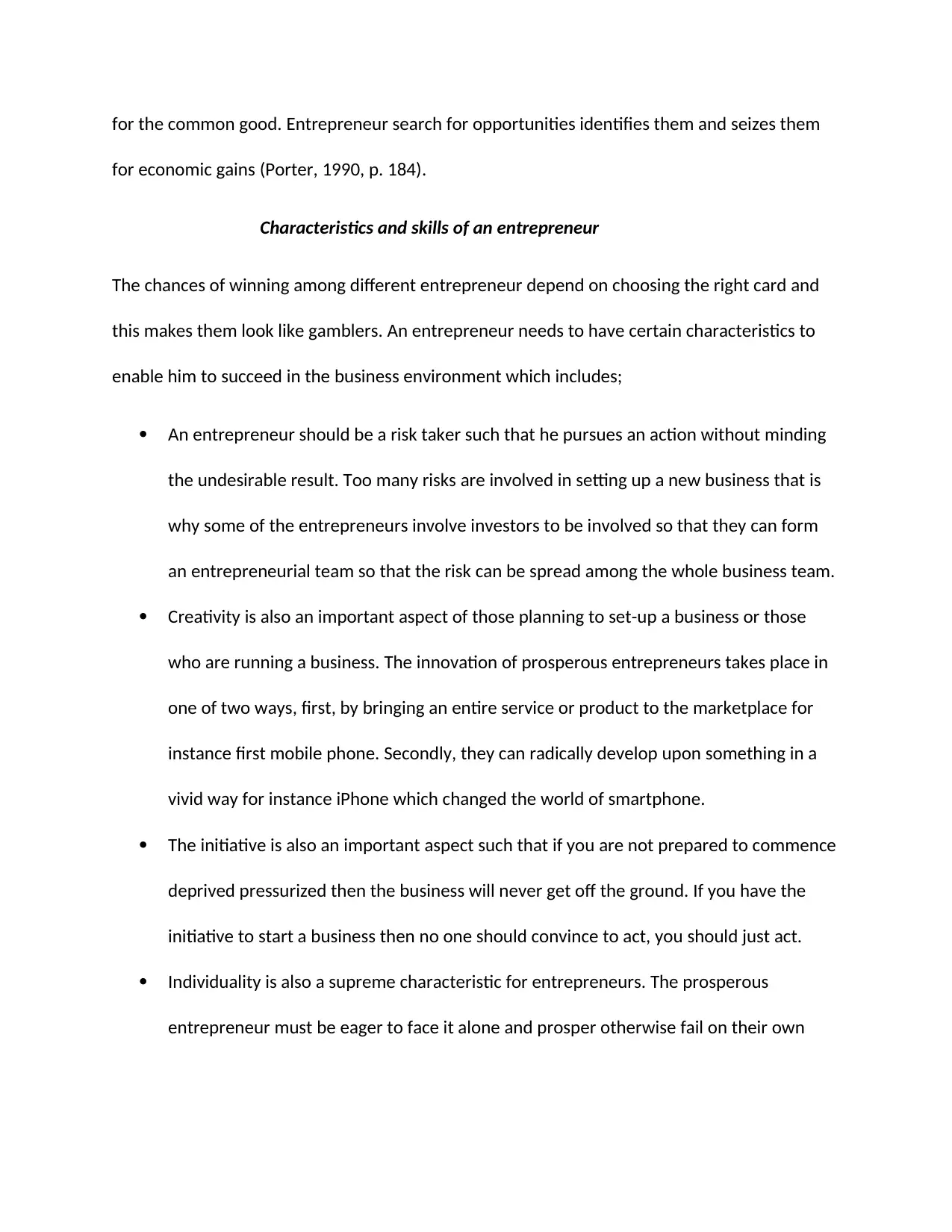
for the common good. Entrepreneur search for opportunities identifies them and seizes them
for economic gains (Porter, 1990, p. 184).
Characteristics and skills of an entrepreneur
The chances of winning among different entrepreneur depend on choosing the right card and
this makes them look like gamblers. An entrepreneur needs to have certain characteristics to
enable him to succeed in the business environment which includes;
An entrepreneur should be a risk taker such that he pursues an action without minding
the undesirable result. Too many risks are involved in setting up a new business that is
why some of the entrepreneurs involve investors to be involved so that they can form
an entrepreneurial team so that the risk can be spread among the whole business team.
Creativity is also an important aspect of those planning to set-up a business or those
who are running a business. The innovation of prosperous entrepreneurs takes place in
one of two ways, first, by bringing an entire service or product to the marketplace for
instance first mobile phone. Secondly, they can radically develop upon something in a
vivid way for instance iPhone which changed the world of smartphone.
The initiative is also an important aspect such that if you are not prepared to commence
deprived pressurized then the business will never get off the ground. If you have the
initiative to start a business then no one should convince to act, you should just act.
Individuality is also a supreme characteristic for entrepreneurs. The prosperous
entrepreneur must be eager to face it alone and prosper otherwise fail on their own
for economic gains (Porter, 1990, p. 184).
Characteristics and skills of an entrepreneur
The chances of winning among different entrepreneur depend on choosing the right card and
this makes them look like gamblers. An entrepreneur needs to have certain characteristics to
enable him to succeed in the business environment which includes;
An entrepreneur should be a risk taker such that he pursues an action without minding
the undesirable result. Too many risks are involved in setting up a new business that is
why some of the entrepreneurs involve investors to be involved so that they can form
an entrepreneurial team so that the risk can be spread among the whole business team.
Creativity is also an important aspect of those planning to set-up a business or those
who are running a business. The innovation of prosperous entrepreneurs takes place in
one of two ways, first, by bringing an entire service or product to the marketplace for
instance first mobile phone. Secondly, they can radically develop upon something in a
vivid way for instance iPhone which changed the world of smartphone.
The initiative is also an important aspect such that if you are not prepared to commence
deprived pressurized then the business will never get off the ground. If you have the
initiative to start a business then no one should convince to act, you should just act.
Individuality is also a supreme characteristic for entrepreneurs. The prosperous
entrepreneur must be eager to face it alone and prosper otherwise fail on their own
Paraphrase This Document
Need a fresh take? Get an instant paraphrase of this document with our AI Paraphraser
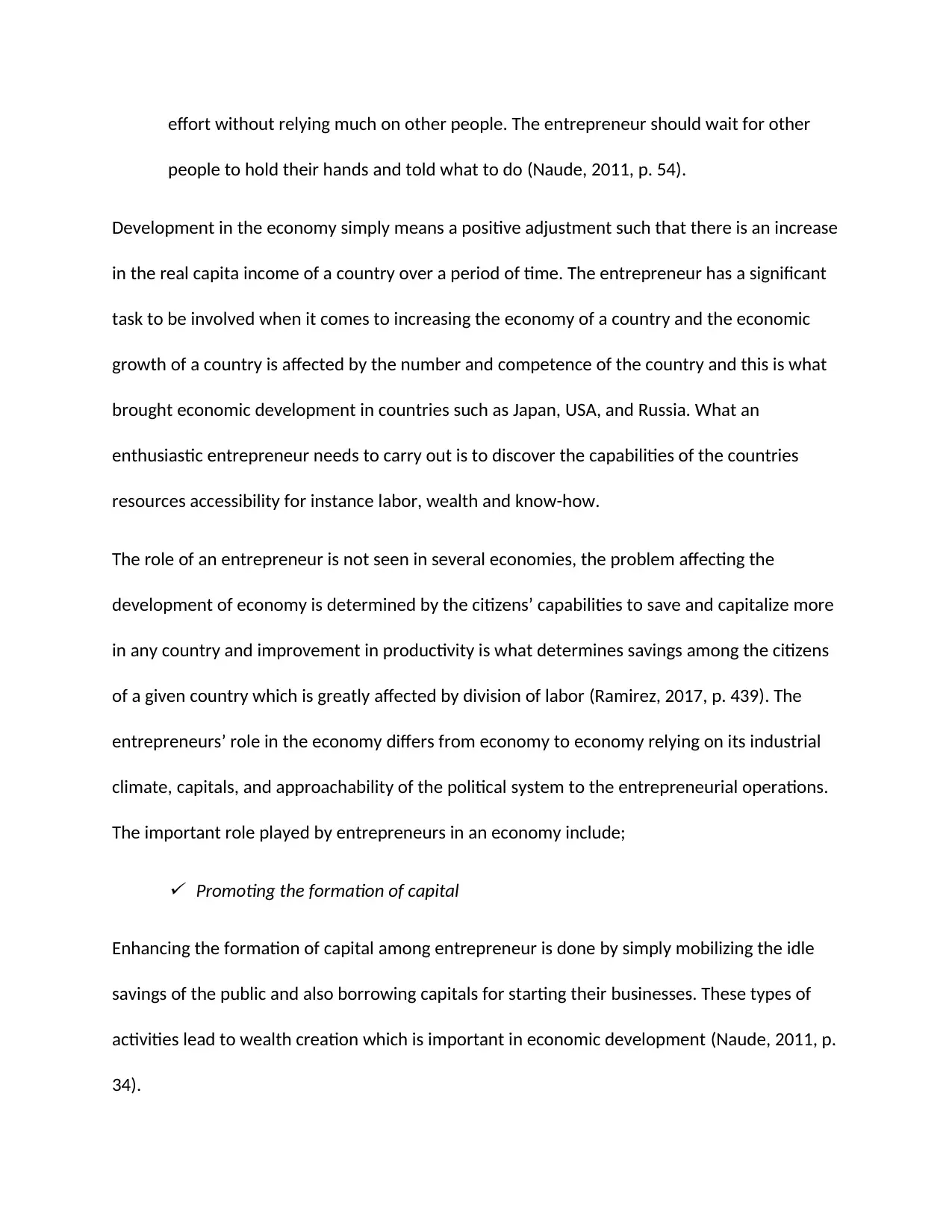
effort without relying much on other people. The entrepreneur should wait for other
people to hold their hands and told what to do (Naude, 2011, p. 54).
Development in the economy simply means a positive adjustment such that there is an increase
in the real capita income of a country over a period of time. The entrepreneur has a significant
task to be involved when it comes to increasing the economy of a country and the economic
growth of a country is affected by the number and competence of the country and this is what
brought economic development in countries such as Japan, USA, and Russia. What an
enthusiastic entrepreneur needs to carry out is to discover the capabilities of the countries
resources accessibility for instance labor, wealth and know-how.
The role of an entrepreneur is not seen in several economies, the problem affecting the
development of economy is determined by the citizens’ capabilities to save and capitalize more
in any country and improvement in productivity is what determines savings among the citizens
of a given country which is greatly affected by division of labor (Ramirez, 2017, p. 439). The
entrepreneurs’ role in the economy differs from economy to economy relying on its industrial
climate, capitals, and approachability of the political system to the entrepreneurial operations.
The important role played by entrepreneurs in an economy include;
Promoting the formation of capital
Enhancing the formation of capital among entrepreneur is done by simply mobilizing the idle
savings of the public and also borrowing capitals for starting their businesses. These types of
activities lead to wealth creation which is important in economic development (Naude, 2011, p.
34).
people to hold their hands and told what to do (Naude, 2011, p. 54).
Development in the economy simply means a positive adjustment such that there is an increase
in the real capita income of a country over a period of time. The entrepreneur has a significant
task to be involved when it comes to increasing the economy of a country and the economic
growth of a country is affected by the number and competence of the country and this is what
brought economic development in countries such as Japan, USA, and Russia. What an
enthusiastic entrepreneur needs to carry out is to discover the capabilities of the countries
resources accessibility for instance labor, wealth and know-how.
The role of an entrepreneur is not seen in several economies, the problem affecting the
development of economy is determined by the citizens’ capabilities to save and capitalize more
in any country and improvement in productivity is what determines savings among the citizens
of a given country which is greatly affected by division of labor (Ramirez, 2017, p. 439). The
entrepreneurs’ role in the economy differs from economy to economy relying on its industrial
climate, capitals, and approachability of the political system to the entrepreneurial operations.
The important role played by entrepreneurs in an economy include;
Promoting the formation of capital
Enhancing the formation of capital among entrepreneur is done by simply mobilizing the idle
savings of the public and also borrowing capitals for starting their businesses. These types of
activities lead to wealth creation which is important in economic development (Naude, 2011, p.
34).
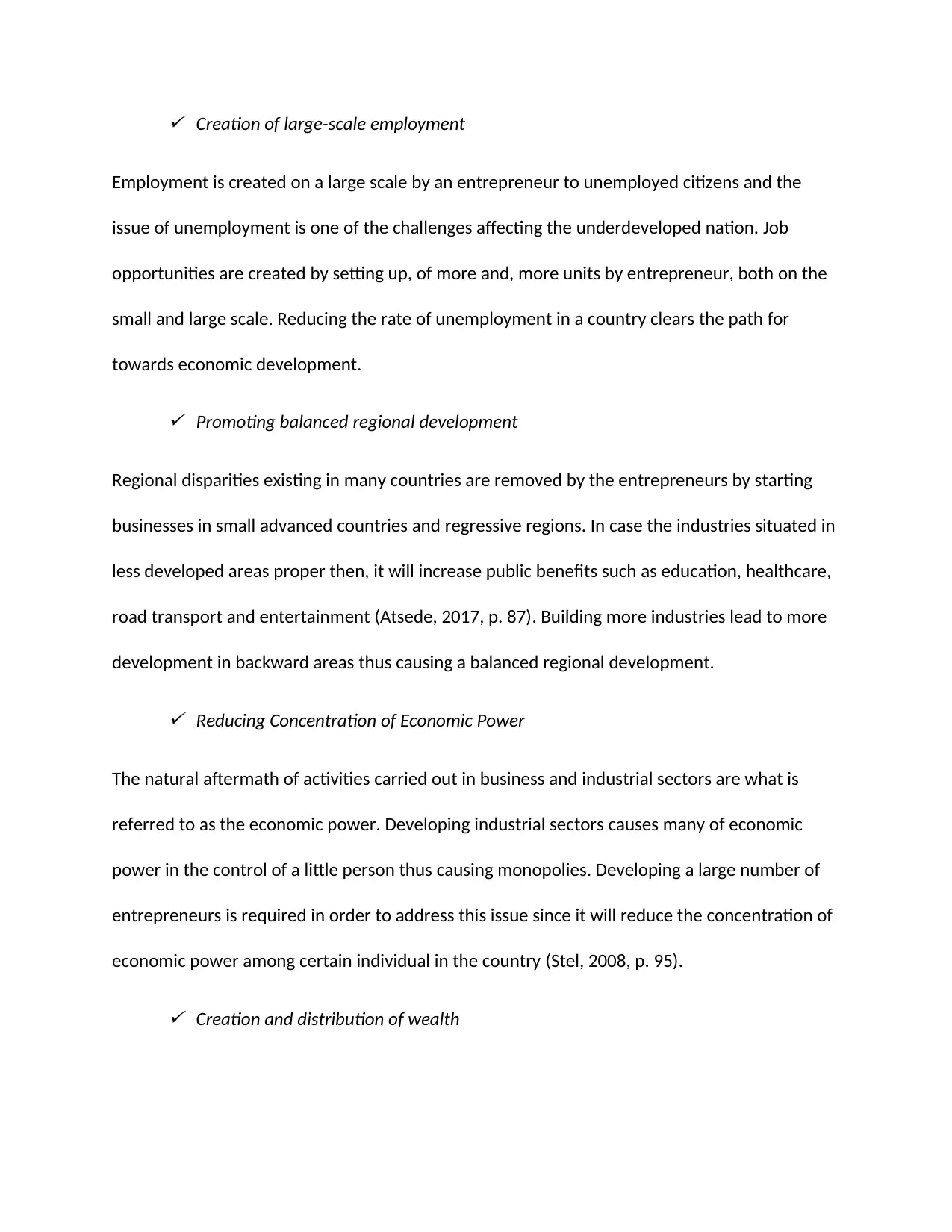
Creation of large-scale employment
Employment is created on a large scale by an entrepreneur to unemployed citizens and the
issue of unemployment is one of the challenges affecting the underdeveloped nation. Job
opportunities are created by setting up, of more and, more units by entrepreneur, both on the
small and large scale. Reducing the rate of unemployment in a country clears the path for
towards economic development.
Promoting balanced regional development
Regional disparities existing in many countries are removed by the entrepreneurs by starting
businesses in small advanced countries and regressive regions. In case the industries situated in
less developed areas proper then, it will increase public benefits such as education, healthcare,
road transport and entertainment (Atsede, 2017, p. 87). Building more industries lead to more
development in backward areas thus causing a balanced regional development.
Reducing Concentration of Economic Power
The natural aftermath of activities carried out in business and industrial sectors are what is
referred to as the economic power. Developing industrial sectors causes many of economic
power in the control of a little person thus causing monopolies. Developing a large number of
entrepreneurs is required in order to address this issue since it will reduce the concentration of
economic power among certain individual in the country (Stel, 2008, p. 95).
Creation and distribution of wealth
Employment is created on a large scale by an entrepreneur to unemployed citizens and the
issue of unemployment is one of the challenges affecting the underdeveloped nation. Job
opportunities are created by setting up, of more and, more units by entrepreneur, both on the
small and large scale. Reducing the rate of unemployment in a country clears the path for
towards economic development.
Promoting balanced regional development
Regional disparities existing in many countries are removed by the entrepreneurs by starting
businesses in small advanced countries and regressive regions. In case the industries situated in
less developed areas proper then, it will increase public benefits such as education, healthcare,
road transport and entertainment (Atsede, 2017, p. 87). Building more industries lead to more
development in backward areas thus causing a balanced regional development.
Reducing Concentration of Economic Power
The natural aftermath of activities carried out in business and industrial sectors are what is
referred to as the economic power. Developing industrial sectors causes many of economic
power in the control of a little person thus causing monopolies. Developing a large number of
entrepreneurs is required in order to address this issue since it will reduce the concentration of
economic power among certain individual in the country (Stel, 2008, p. 95).
Creation and distribution of wealth
⊘ This is a preview!⊘
Do you want full access?
Subscribe today to unlock all pages.

Trusted by 1+ million students worldwide
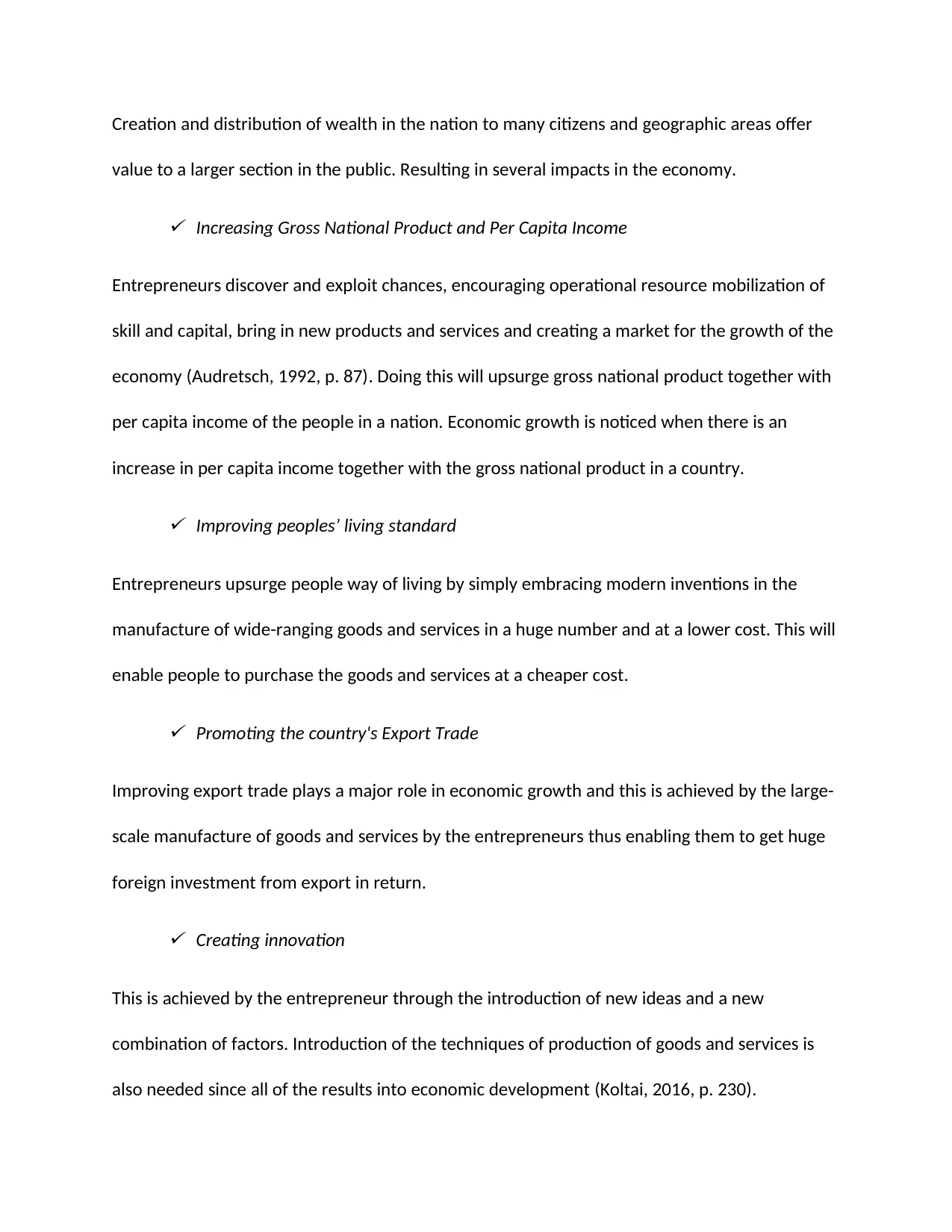
Creation and distribution of wealth in the nation to many citizens and geographic areas offer
value to a larger section in the public. Resulting in several impacts in the economy.
Increasing Gross National Product and Per Capita Income
Entrepreneurs discover and exploit chances, encouraging operational resource mobilization of
skill and capital, bring in new products and services and creating a market for the growth of the
economy (Audretsch, 1992, p. 87). Doing this will upsurge gross national product together with
per capita income of the people in a nation. Economic growth is noticed when there is an
increase in per capita income together with the gross national product in a country.
Improving peoples’ living standard
Entrepreneurs upsurge people way of living by simply embracing modern inventions in the
manufacture of wide-ranging goods and services in a huge number and at a lower cost. This will
enable people to purchase the goods and services at a cheaper cost.
Promoting the country's Export Trade
Improving export trade plays a major role in economic growth and this is achieved by the large-
scale manufacture of goods and services by the entrepreneurs thus enabling them to get huge
foreign investment from export in return.
Creating innovation
This is achieved by the entrepreneur through the introduction of new ideas and a new
combination of factors. Introduction of the techniques of production of goods and services is
also needed since all of the results into economic development (Koltai, 2016, p. 230).
value to a larger section in the public. Resulting in several impacts in the economy.
Increasing Gross National Product and Per Capita Income
Entrepreneurs discover and exploit chances, encouraging operational resource mobilization of
skill and capital, bring in new products and services and creating a market for the growth of the
economy (Audretsch, 1992, p. 87). Doing this will upsurge gross national product together with
per capita income of the people in a nation. Economic growth is noticed when there is an
increase in per capita income together with the gross national product in a country.
Improving peoples’ living standard
Entrepreneurs upsurge people way of living by simply embracing modern inventions in the
manufacture of wide-ranging goods and services in a huge number and at a lower cost. This will
enable people to purchase the goods and services at a cheaper cost.
Promoting the country's Export Trade
Improving export trade plays a major role in economic growth and this is achieved by the large-
scale manufacture of goods and services by the entrepreneurs thus enabling them to get huge
foreign investment from export in return.
Creating innovation
This is achieved by the entrepreneur through the introduction of new ideas and a new
combination of factors. Introduction of the techniques of production of goods and services is
also needed since all of the results into economic development (Koltai, 2016, p. 230).
Paraphrase This Document
Need a fresh take? Get an instant paraphrase of this document with our AI Paraphraser
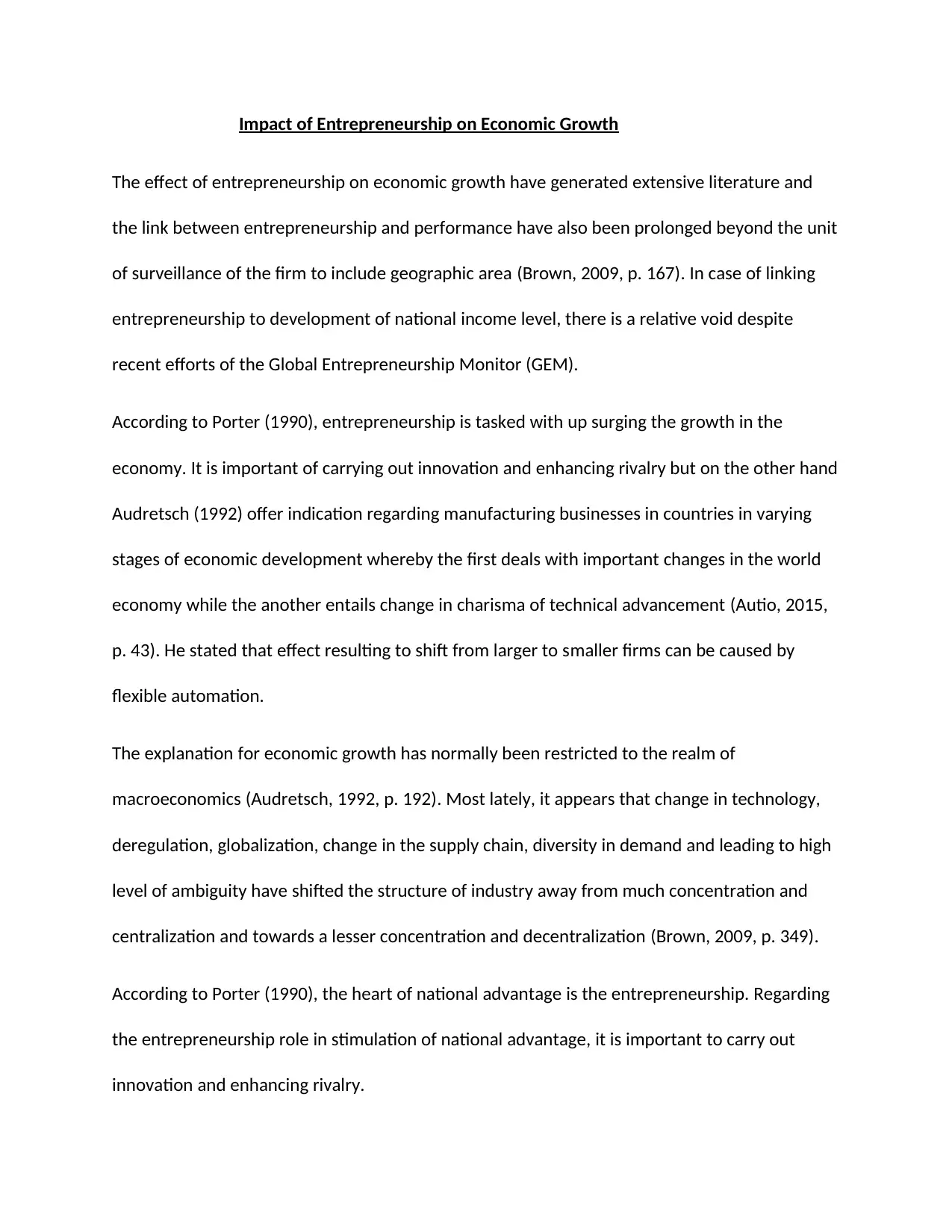
Impact of Entrepreneurship on Economic Growth
The effect of entrepreneurship on economic growth have generated extensive literature and
the link between entrepreneurship and performance have also been prolonged beyond the unit
of surveillance of the firm to include geographic area (Brown, 2009, p. 167). In case of linking
entrepreneurship to development of national income level, there is a relative void despite
recent efforts of the Global Entrepreneurship Monitor (GEM).
According to Porter (1990), entrepreneurship is tasked with up surging the growth in the
economy. It is important of carrying out innovation and enhancing rivalry but on the other hand
Audretsch (1992) offer indication regarding manufacturing businesses in countries in varying
stages of economic development whereby the first deals with important changes in the world
economy while the another entails change in charisma of technical advancement (Autio, 2015,
p. 43). He stated that effect resulting to shift from larger to smaller firms can be caused by
flexible automation.
The explanation for economic growth has normally been restricted to the realm of
macroeconomics (Audretsch, 1992, p. 192). Most lately, it appears that change in technology,
deregulation, globalization, change in the supply chain, diversity in demand and leading to high
level of ambiguity have shifted the structure of industry away from much concentration and
centralization and towards a lesser concentration and decentralization (Brown, 2009, p. 349).
According to Porter (1990), the heart of national advantage is the entrepreneurship. Regarding
the entrepreneurship role in stimulation of national advantage, it is important to carry out
innovation and enhancing rivalry.
The effect of entrepreneurship on economic growth have generated extensive literature and
the link between entrepreneurship and performance have also been prolonged beyond the unit
of surveillance of the firm to include geographic area (Brown, 2009, p. 167). In case of linking
entrepreneurship to development of national income level, there is a relative void despite
recent efforts of the Global Entrepreneurship Monitor (GEM).
According to Porter (1990), entrepreneurship is tasked with up surging the growth in the
economy. It is important of carrying out innovation and enhancing rivalry but on the other hand
Audretsch (1992) offer indication regarding manufacturing businesses in countries in varying
stages of economic development whereby the first deals with important changes in the world
economy while the another entails change in charisma of technical advancement (Autio, 2015,
p. 43). He stated that effect resulting to shift from larger to smaller firms can be caused by
flexible automation.
The explanation for economic growth has normally been restricted to the realm of
macroeconomics (Audretsch, 1992, p. 192). Most lately, it appears that change in technology,
deregulation, globalization, change in the supply chain, diversity in demand and leading to high
level of ambiguity have shifted the structure of industry away from much concentration and
centralization and towards a lesser concentration and decentralization (Brown, 2009, p. 349).
According to Porter (1990), the heart of national advantage is the entrepreneurship. Regarding
the entrepreneurship role in stimulation of national advantage, it is important to carry out
innovation and enhancing rivalry.
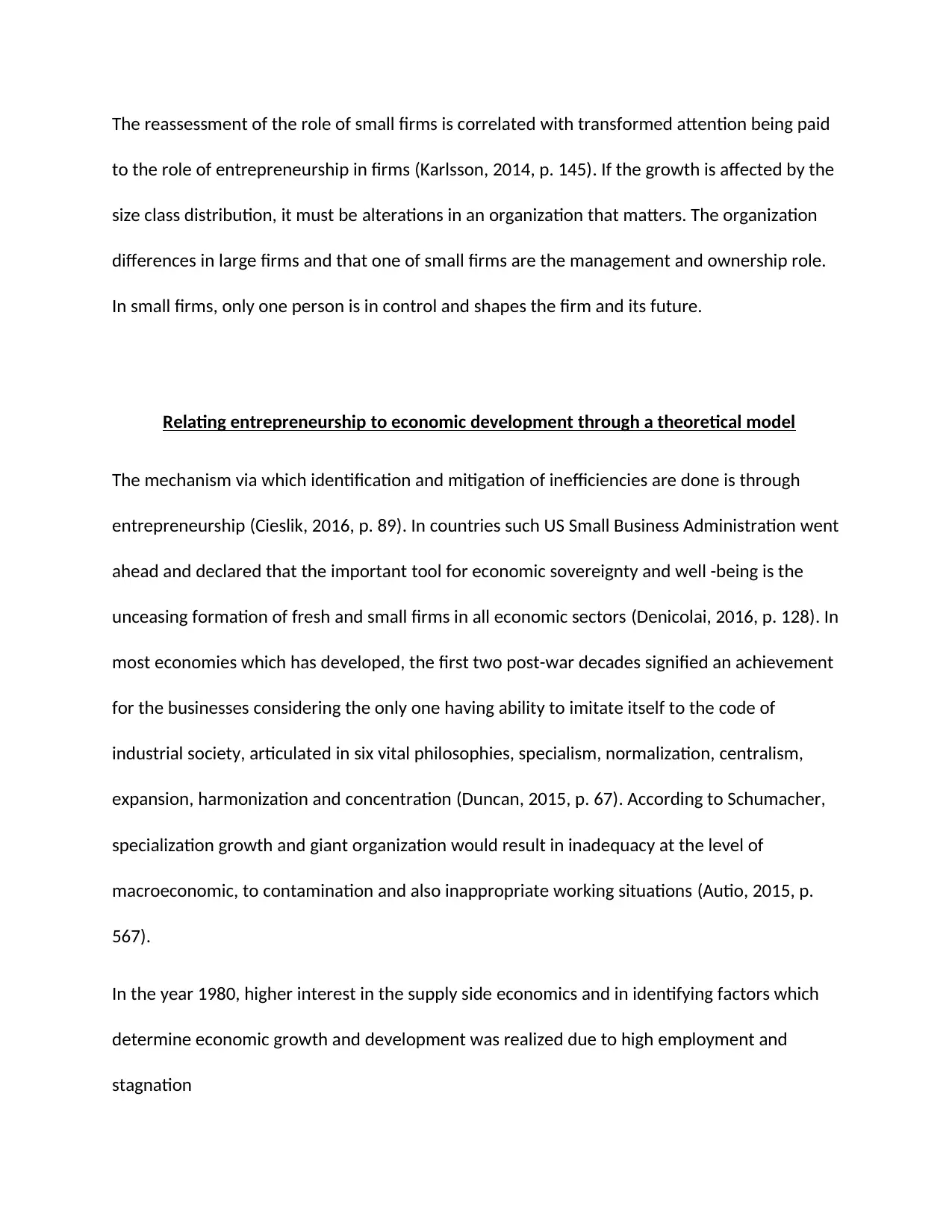
The reassessment of the role of small firms is correlated with transformed attention being paid
to the role of entrepreneurship in firms (Karlsson, 2014, p. 145). If the growth is affected by the
size class distribution, it must be alterations in an organization that matters. The organization
differences in large firms and that one of small firms are the management and ownership role.
In small firms, only one person is in control and shapes the firm and its future.
Relating entrepreneurship to economic development through a theoretical model
The mechanism via which identification and mitigation of inefficiencies are done is through
entrepreneurship (Cieslik, 2016, p. 89). In countries such US Small Business Administration went
ahead and declared that the important tool for economic sovereignty and well -being is the
unceasing formation of fresh and small firms in all economic sectors (Denicolai, 2016, p. 128). In
most economies which has developed, the first two post-war decades signified an achievement
for the businesses considering the only one having ability to imitate itself to the code of
industrial society, articulated in six vital philosophies, specialism, normalization, centralism,
expansion, harmonization and concentration (Duncan, 2015, p. 67). According to Schumacher,
specialization growth and giant organization would result in inadequacy at the level of
macroeconomic, to contamination and also inappropriate working situations (Autio, 2015, p.
567).
In the year 1980, higher interest in the supply side economics and in identifying factors which
determine economic growth and development was realized due to high employment and
stagnation
to the role of entrepreneurship in firms (Karlsson, 2014, p. 145). If the growth is affected by the
size class distribution, it must be alterations in an organization that matters. The organization
differences in large firms and that one of small firms are the management and ownership role.
In small firms, only one person is in control and shapes the firm and its future.
Relating entrepreneurship to economic development through a theoretical model
The mechanism via which identification and mitigation of inefficiencies are done is through
entrepreneurship (Cieslik, 2016, p. 89). In countries such US Small Business Administration went
ahead and declared that the important tool for economic sovereignty and well -being is the
unceasing formation of fresh and small firms in all economic sectors (Denicolai, 2016, p. 128). In
most economies which has developed, the first two post-war decades signified an achievement
for the businesses considering the only one having ability to imitate itself to the code of
industrial society, articulated in six vital philosophies, specialism, normalization, centralism,
expansion, harmonization and concentration (Duncan, 2015, p. 67). According to Schumacher,
specialization growth and giant organization would result in inadequacy at the level of
macroeconomic, to contamination and also inappropriate working situations (Autio, 2015, p.
567).
In the year 1980, higher interest in the supply side economics and in identifying factors which
determine economic growth and development was realized due to high employment and
stagnation
⊘ This is a preview!⊘
Do you want full access?
Subscribe today to unlock all pages.

Trusted by 1+ million students worldwide
1 out of 16
Related Documents
Your All-in-One AI-Powered Toolkit for Academic Success.
+13062052269
info@desklib.com
Available 24*7 on WhatsApp / Email
![[object Object]](/_next/static/media/star-bottom.7253800d.svg)
Unlock your academic potential
Copyright © 2020–2026 A2Z Services. All Rights Reserved. Developed and managed by ZUCOL.




